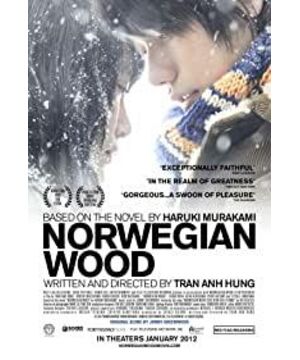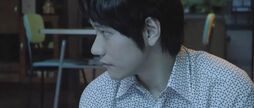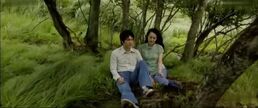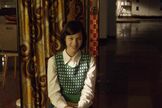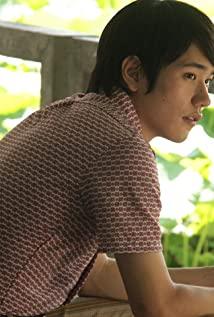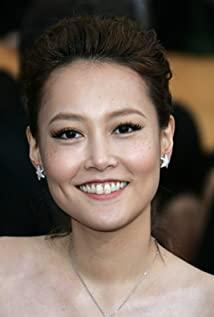The first 40 minutes, mainly from the relationship between Watanabe (male lead), Naoko, and Kizuki, to Kizuki's suicide and then Watanabe and Naoko have sex. At the beginning, a lot of small fragments are used to pile up the three-person relationship mode, which is a little verbose but acceptable. When it came to Kizuki's suicide, I found out that the director was crazy, why did you remove the very artistic lines in the book and replace them with meaningless dialogues? The night Kizuki was about to commit suicide, he played pool with Watanabe. The book is like this: Kizuki played very seriously at the time. After winning, Watanabe said that you are rarely so serious today, Kizuki said with a smile: "I don't want to lose today." God, "I don't want to lose today", what a fucking cool sentence! What does this episode turn into in the movie? After Kuziki won, Watanabe said, "I'll pay the bill," and it was over. I have to ask, how the fuck does it matter who pays the bill? It's so important that you drop the original lines.
Maybe I'm being a little picky, but is it just a line that needs to be criticized like this? You must know that Haruki Murakami's lines are excellent and impressive. Since the director has the courage to challenge him, he must take responsibility. I think the result of the challenge is a whole bird. This part of Kizuki is the first time the director has tampered with lines that should not have been changed. After that, there are still a lot of things to say, so I especially caught his debut as a representative whip and told him, "Fuck you. make a mistake".
Then we got to the part where Watanabe and Naoko had sex. How to say this, I understand that the director has a mission to make "this is the saddest sound I've ever heard of a climax", but why is it so uneasy and impatient, what Naoko Is it too loud or Watanabe is moving too fast, I must say that writing this paragraph is a little guilty, although I know he's bad, but I can't tell what's wrong. Some people say that you are so good at scolding, what do you think is a better way to shoot? Sometimes I say it, but maybe not here, I just feel fucking bad, sorry I'm irresponsible. But then again, I'm not the only one who thinks this way, at least the couple who left the venue early died along with Watanabe's sperm.
Today I am Haruki Murakami, and I hand over a perfect novel "Norwegian Forest" to the director: "Please make him into a thrilling movie". I sat next to the director at the premiere and watched it for 40 minutes, and it was almost time for me to strangle him. So, I'm not at all surprised when someone leaves at this time. After this period, it got a little better.
When a novel is turned into a movie, what do we look forward to most? Personally, I think it is whether the characters in the novel are in line with the imagination. For example, when discussing Jin Yong's novels, everyone likes to focus on who is suitable for Huang Rong and Zhang Wuji.
What about "Norwegian forests"?
Watanabe: I think he is the most trouble-free character. We can see that he has two faces. When facing Naoko, he is more silent and is almost always a listener. "Of course" is the line he says the most. When facing Lu, he became a humorous senior. In the book, his rivalry with Lu was more likeable, but in the movie, it was considered a pass. The first meeting between Watanabe and Midori is my favorite scene. Fortunately, it is almost completely based on the book. The interaction between the two is just like the picture I imagined while reading the book. From here, I am highly sure of the male lead. Acting, I am also very grateful to the director for keeping at least one role.
Naoko: Basically, for this casting, the looks are not pretty, but the breath is very good, and the shape is OK. The disadvantage is that Naoko in the movie is too extroverted. In the book, apart from crying fiercely, she feels cold. Even if she is sad, she will not speak loudly, nor will she push Watanabe away from the bed. It won't shout out: "Your existence makes me very painful", and the hysterical start on the grassland is even a nightmare.
Green: I don't understand why the director wanted to murder this character. To be honest, I often go to the toilet and bring a copy of "Norwegian Forest" in, and then I only select the part of Green to watch. Green is the soul of the whole book, do you understand, director? Green is very clearly described in the book, including hairstyles, clothes, movements, is the director fucking blind to it? The little monk's short hair was changed to Tang Wei's head in the early years of the Republic of China, trousers were changed to skirts, and denim skirts that were too short to be short were changed to knee-length flowing skirts. Why? I don't have much opinion on the shape change, what's more outrageous is that even the personality has been weakened to a miserable level.
Yes, Green is a headstrong girl, but she has other things too. What about those funny dialogues? Just hearing it is enough to make people fall in love with her, where did the dialogue go? "What do you think is the biggest advantage of being rich? You can say that I don't have money." I grabbed a random sentence on Facebook, and I would get 100 likes. Green just uses her unique perspective to interpret the world, and then says interesting and relevant words. I can't find any heroine in a novel that can be as humorous as her. In the movie, Lu didn't have the opportunity to express her likable personality. The only thing that allowed her to show her character was the dialogue of "pursuit of absolute willfulness". She was just a body of "pursuit of absolute willfulness". Where is our green? I continued to shout green in the center of a certain hall of Xinyi Roadshow.
Brother Yongze: He is a cowherd at all. Can't really make him cool? His first sentence in the novel is: "If you can read "The Tycoon Biography" three times, you should be able to be my friend." What a characterful opening, but I couldn't find him in the movie. The new good boy's lyrics: "tell me why?"
Commando: If the director doesn't care about the role at all, just remove it entirely, don't like to play it. A lot of ink was spent in the book creating this funny guy, but in the movie, we only see a passerby who barely has any lines and leaves a note as he leaves.
Sister Chumei: This is one of the characters with better performances. It fully shows the noble style of Sister Chumei, her forbearance attitude towards Brother Yongze, and her slight outburst at the end is just right. That's right!
Sister Reiko: Another inexplicable story. Sister Reiko is a very important character in the book. Many of his dialogues with Watanabe are crucial, and she also has her own story. Such a heavyweight, in the end, had sex in order to share the grief for Naoko with Watanabe. Even so, when I was reading the book, it was still a little unacceptable.
What's more, in the movie, Sister Reiko is just a person who will be photographed in cutscenes. Such a thin and thin character, she finally rushed out of the mental hospital and said: "Sex with me", "Seven years of regrets are finally satisfied. "Who the hell is this trying to convince? Sex that makes sense is called "Norwegian forest", and sex that doesn't make sense is called "Norwegian wet little forest".
Aside from the character, I really think, is this director too deep for me, he does something, but I don't get the message he's trying to convey at all. For example, what does the never-ending close-up represent? What does the super loud classical string music in the cutscene represent? Every time I hear that abrupt string, I think the sound is broken. A lot of scenery far-reaching photos are indeed beautiful, but unfortunately, this is not the "Norwegian Rainforest" of the Discovery Channel, the scenery can only be icing on the cake, and can't help. Seeing beautiful scenery in a story that has been completely destroyed, every time I watch it, my mood becomes unbearable sadness. What does Watanabe cry until his saliva and snot are pulled to the back of his head? There are many ways to express sadness, you don't need to choose such a distracting picture, tell me who in the movie theater is not focused on Watanabe's saliva.
Finally, I want to say that the novel "Norwegian Wood" is a huge masterpiece. Who in the world can say that he has fully understood him? We all only see some part of what the author wants to express, and we are all blind in the forest. As far as I'm concerned, I like the characters in the book the most, so it's impossible for me to like this movie. The director touched another part, maybe he took a fancy to the meaning of "sex", so he derived a "Norwegian forest" that belonged to him. Of course, I think he sucks, but that doesn't mean it's a bad movie. A forest, each expressing itself.
View more about Norwegian Wood reviews


